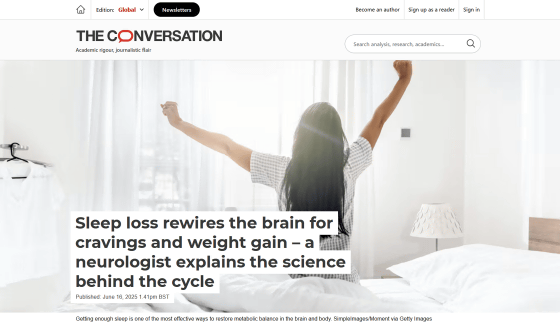Just one night of sleep deprivation can change the way your brain perceives food, leading to overeating

Many people have probably experienced losing sleep because they stay up late looking at social media, reading the latest volume of a manga they're interested in, or checking work emails, even though they know they should go to bed early. You might think that a single night of sleep deprivation is okay, but in fact, just one night of sleep deprivation can change the brain's perception of food, which can lead to overeating and obesity.
Sleep loss rewires the brain for cravings and weight gain – a neurologist explains the science behind the cycle
https://theconversation.com/sleep-loss-rewires-the-brain-for-cravings-and-weight-gain-a-neurologist-explains-the-science-behind-the-cycle-255726

Lack of sleep affects people all over the world: According to the Centers for Disease Control and Prevention (CDC) , more than one-third of American adults get less than seven hours of sleep a night, and only a quarter of adolescents get the recommended eight to 10 hours on weekdays.
While lack of sleep can happen to anyone, essential workers such as nurses, firefighters, and ambulance personnel, who often work night shifts or shift work, are particularly susceptible to sleep deprivation. When you don't get enough sleep, you tend to crave greasy food and snack more, but Fong-Isariyawongse points out, 'This isn't just a matter of willpower. Your rest-deprived brain leads you to quick, high-calorie foods.'

Fong-Isariyawongse explains why lack of sleep can make you crave fatty, high-calorie foods and lead to overeating:
Lack of sleep disrupts the hormones that control your appetite
The body regulates hunger through a feedback loop involving two main hormones:
A 2022 study showed that even a single night of sleep deprivation increases ghrelin levels and decreases leptin levels, which results in increased hunger and decreased feelings of fullness after a meal.
These changes are not minor: Controlled studies have shown that when healthy adults are deprived of just four to five hours of sleep, they experience increased hunger and a desire for high-calorie foods . Continued sleep deprivation can exacerbate this condition, potentially leading to chronic increased appetite.

Lack of sleep puts the brain into reward mode
Sleep deprivation also has been shown to affect how the brain evaluates food, with just one night of sleep deprivation
'Simply put, the brain becomes more susceptible to the temptation of junk food and less able to resist it,' Fong-Isariyawongse said. 'Not only did sleep-deprived participants rate high-calorie foods as more attractive, they were also more likely to choose them regardless of how hungry they felt.'
Lack of sleep slows down your metabolism and causes you to gain weight
When you get enough sleep, your body is able to use insulin efficiently to get glucose (sugar) out of your blood and use it to fuel your cells, but even a single night of sleep deprivation can reduce insulin sensitivity by up to 25% , leading to higher blood sugar levels.
When the body can't process sugars efficiently, they're more likely to be converted into fat, which can lead to weight gain and an increased risk of metabolic syndrome. Lack of sleep also increases levels of the stress hormone cortisol , which can lead to fat storage around the abdomen and increased appetite.

◆ Sleep is the metabolic reset button
In today's busy society, it is easy to think of sleep as 'wasted time that can't be used for any activities,' and many people are looking for ways to shorten their sleep time as much as possible. However, sleep is not a waste of time for the body; it is important for the brain to readjust hunger and reward signals, reset hormone secretion, and stabilize metabolism. Just one or two days of high-quality sleep can reverse the damage caused by lack of sleep and begin to restore the body's natural balance.
'The next time you find yourself reaching for junk food after a sleep-deprived night, don't think that your physiology is betraying you - it's just reacting to stress and fatigue. The most effective way to restore balance is through sleep, not extreme dieting or caffeine. Sleep is not a luxury - it's the most powerful tool we have for controlling appetite, regulating energy and maintaining long-term health,' Fong-Isariyawongse said.
Related Posts:
in Free Member, Science, Food, Posted by log1h_ik







